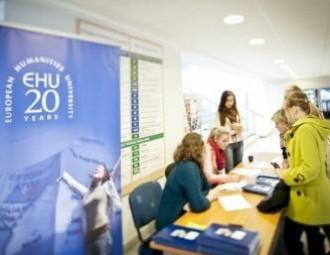European Humanities University introduces new reforms

Recently the European Humanities University, also known as Belarusian University in exile, held elections for its Senate, followed by the debate for the university’s future, writes Paula Borowska.
Although the Senate is just one of several bodies which govern EHU, the result may affect the direction of EHU's reforms.
Unlike previous elections, which often went unnoticed by the Belarusian press, this time a group of EHU academics united under a platform called 'For a New EHU' which conducted a vibrant electoral campaign. The vast majority of the newly elected Senate members supported the platform. The election campaign with the elections themselves, held on November 19, provoked discussions in Belarusian media about the direction EHU is taking under its current administration.
The main topics raised during the Senate election campaign included the role of academics in the governance of the university in exile and whether the Belarusian university in exile could do more for Belarusian society.
The Rector of the University responded to criticism by explaining that the university needs changes to improve the quality of its scholarship and teaching and also to remain competitive.
Academics Want More Involvement
A public debate started after a group of lecturers adopted a manifesto criticising the management style of the EHU administration as being not democratic enough.
The group 'For a new EHU' consisted of the Chairman of the EHU Senate Pavel Cierashkovich and a number of lecturers including Volha Shparaha, Andrej Laurukhin and Maxim Zhbankou.
According to the manifesto, the university often made important decisions without meaningful consultations with EHU academics. The academics argued that the management excluded representatives of the Senate and labour unions from the decision making process related to the future of the university.
The lecturers also claimed that most Belarusian academics have to work for the university without employment contracts. They called for strengthening the role of the Senate and EHU academics and the introduction of regular rotations for key administrators, including the rector.
In their view, the university is losing its humanities identity, as well as its ties to Belarusian society. Therefore, the EHU should also develop Belarus-oriented programmes for students and encourage teaching in the Belarusian language and learning the language.
According to the manifesto, co-operation not only with Belarusian NGOs and think tanks, but also prominent Belarusian political and cultural figures, might help to bring the university closer to civil society in Belarus. It also states that the teaching programmes should keep Belarus as a point of focus and involve successful Belarusian academics from around the world.
The EHU administration promises reforms
On 14 November Professor Anatoli Mikhailov, who has been leading the university since its establishment in 1992 responded and shared his vision of the future of the university.
Professor Mikhailov explained that the university planed to hire a core faculty consisting of permanent lecturers after holding an open competition. The budget for salaries will be doubled. The permanent staff is supposed to reside in Vilnius and could claim all social benefits and will have proper employment contracts, in compliance with Lithuanian law.
This change would signify a shift from the previous practise of EHU lecturers regularly commuting from Belarus to teach.
Commenting on whether Belarusian academics will be replaced by other nationals, Mikhailov emphasised that Belarus was and would continue to be at the centre of EHU's focus. He emphasised that the university has always been on the look out for qualified candidates from Belarus.
The rector also explained that to strengthen its focus on Belarus, the EHU is developing a programme of transformation studies. The EHU also wants to revive its Belarusian studies programme which was closed not that long ago. According to Professor Mikhailov, thanks to generous and consistent donor support, the EHU's financial situation has never been better.
The rector commented also on the accusations that the administration had excluded the Senate and representatives of the University's faculty from the decision making process. In his view, the governing structure of the EHU is a hybrid one and consists of international educational experts, foreign donors, the Senate, which is understood to consist of representatives of the EHU administration, staff and students.
He described this model as being one of “stakeholder involvement, separation of powers, and accountable democratic leadership”. In his view, it allows for the efficient, but also democratic management of the university.
Competing or complementary visions of the EHU?
Will the newly selected Senate with majority of supporters of reforms, find a compromise with the university management? In fact, much will depend on the position of the administration of the university. Although the Senate is an important body, its powers, when it comes to real strategic decisions and appointments, is rather limited.
Both the majority of the EHU Senate and the university management think that EHU needs change. On most issues, the positions of the Platform 'For a New EHU' and Rector Mikhailov are not mutually exclusive.
All agree that the University needs to maintain its focus on Belarus, hire Belarusian academics and act as an important platform for debate, research and teaching relevant to Belarus. They also agree that the voice of academics at the EHU should be heard and respected.
Rector Mikhailov already announced that he would discuss with the Senate and try to get its approval of his reforms. One hopes that EHU's management and the Senate will be able to agree on a viable reform plan.
The debate on the future reform of the university, widely covered in Belarusian press, shows diverse opinions among those who work for EHU. The university could benefit from the healthy debates if it makes sure that they lead not to divisions but to improvements and progress.
This will help EHU to balance its Belarusian identity with the challenges of making the university more internationally competitive and strengthening its relevance to Belarus at the same time.
Originally published at BelarusDigest
-
03.01
-
07.10
-
22.09
-
17.08
-
12.08
-
30.09



























